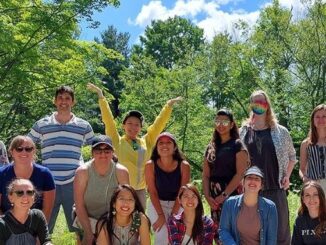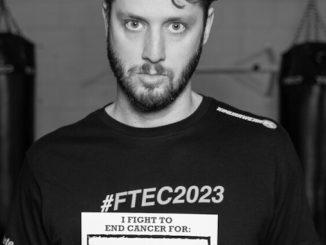The WaterStone Foundation, co-founded by Kim Duffy, was born from her family’s personal struggle with accessing eating disorder treatment. Since 2014, the charity has been increasing access to care, raising awareness, and funding programs like its Student Support initiative, which places therapists on post-secondary campuses.

Describe your charity/non-profit/volunteer work in a few sentences.
WaterStone Foundation was established in 2014 to address a critical gap in services for individuals and families dealing with eating disorders. WaterStone’s mission is to increase access to specialized care, particularly for young people, and to support families who struggle to find the services and supports they need.
The Foundation’s beginnings are rooted in the lived experiences of two families. Both families were motivated to act because of the challenges they faced in seeking treatment for their daughters, who were diagnosed with an eating disorder. One of these families was the Duffy family. Kim and Terry Duffy spent years trying to access treatment for their daughter.
What problem does it aim to solve?
Despite the high prevalence and devastating physical and mental health impacts of eating disorders, publicly funded treatment in Canada is scarce, and private treatment is financially out of reach for most individuals and their families.
WaterStone Foundation is working to change that by raising awareness and funding real solutions for access to prompt treatment. Early treatment saves lives. That’s why we launched our Student Support Program in 2022 at post-secondary schools, which embeds eating disorder therapists on post-secondary campuses. With over 5,000+ hours of free counselling already delivered, we’re committed to expanding this life-saving initiative. Early intervention saves lives, and young people should have to wait months or reach a crisis point before getting help.
When did you start/join it?
I founded WaterStone Foundation 11 years ago because of our personal journey, which began 18 years ago with our eldest daughter. Eating disorders are life-threatening, misunderstood, and increasingly on the rise in both the young and old. They are the deadliest mental health illness, after opioid addiction, yet remain among the least funded and understood.
What made you want to get involved?
Like many families, we were desperate for help — and while we were fortunate to eventually afford private residential care in the U.S., the emotional, logistical, and financial burden was overwhelming. I founded WaterStone because I couldn’t accept that access to life-saving treatment in Canada was so limited or that only the most privileged could afford to save their child. I want other families to have the support and hope we didn’t.
What was the situation like when you started?
When we began this work, eating disorders were largely invisible in Canada’s mental health conversation. Families were on their own, navigating a fragmented system, hitting waitlists that stretched for months, and facing huge costs for private treatment. There were few treatment options outside of hospital crisis care, and almost no early intervention.
How has it changed since?
There’s been growing awareness and a shift in how eating disorders are understood and discussed, but systemic challenges remain. The COVID-19 pandemic made things worse — hospital admissions for adolescents with eating disorders rose by 60%, and demand hasn’t slowed. Waitlists are still unacceptably long, and treatment gaps persist. Progress is happening, but we’re far from where we need to be.
What more needs to be done?
This is an escalating youth mental health crisis. Eating disorders affect nearly 3 million Canadians and have the highest mortality rate of any mental illness among young women —yet public investment remains shockingly low.
Through Waterstone’s Student Support Program, we were able to place therapists on four campuses — but more than 40 other post-secondary institutions still lack any specialized eating disorder support. With sustainable funding, we could expand immediately. We’re calling on governments, institutions, and private donors to help us make sure every student has access to timely, expert care. Lives depend on it.
How can our readers help?
If you know someone with an eating disorder, please let them know they are not alone and that recovery is possible. You can also direct them to programs and services that they may not be aware of here. And lastly, WaterStone is 100% donour-funded. If you are able to make a donation, you can do so here.
Do you have any events coming up?
Our 6th Garden Party took place on June 19th, 2025. We are in the early stages of planning our annual Euchre tournament, which usually takes place in the fall. If you are interested in attending or sponsoring, please check it out here.
Where can we follow you?
Readers can visit our website for more information, and we also welcome donations online.
PAY IT FORWARD: What is an awesome local charity that you love?
Kim is a member of the Toronto West Chapter of 100 Women Who Care, an organization that supports local charities, so she has the opportunity to learn about many local charities.
One of her favourites is Kindred Kitchen, located in Roncesvalles United Church. It provides free meals and companionship to members of the community, providing a sense of dignity and belonging.




